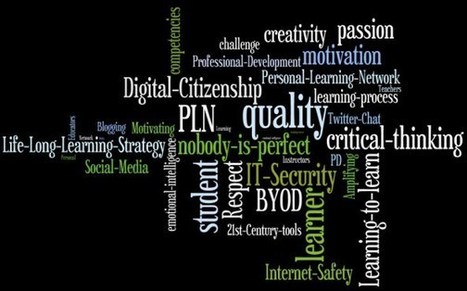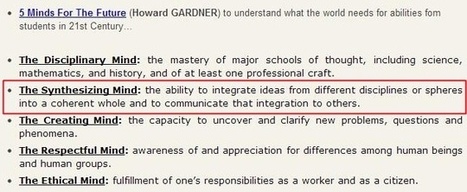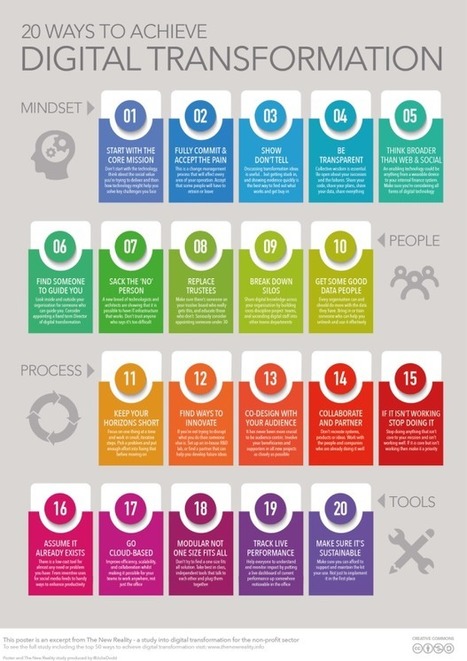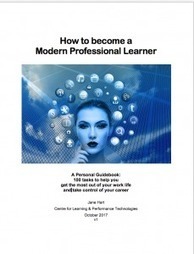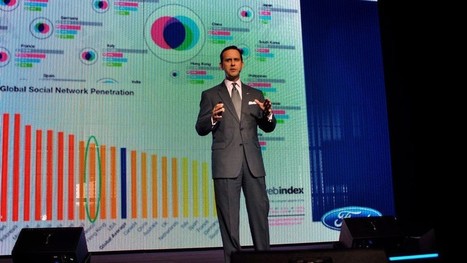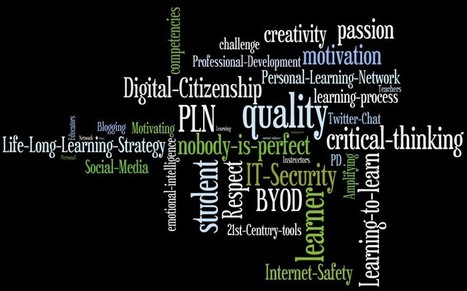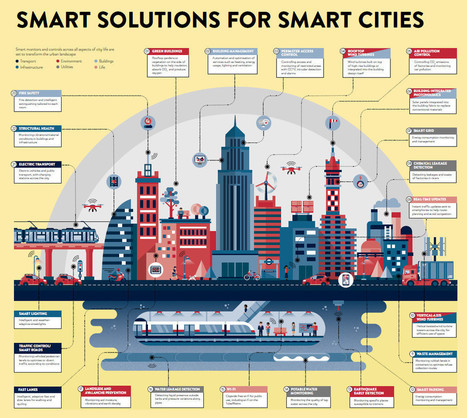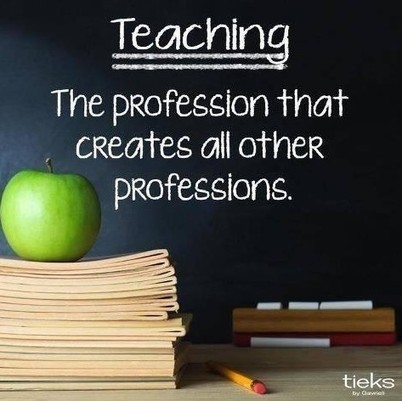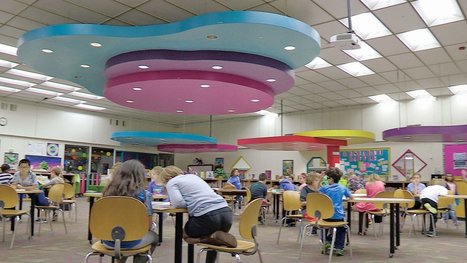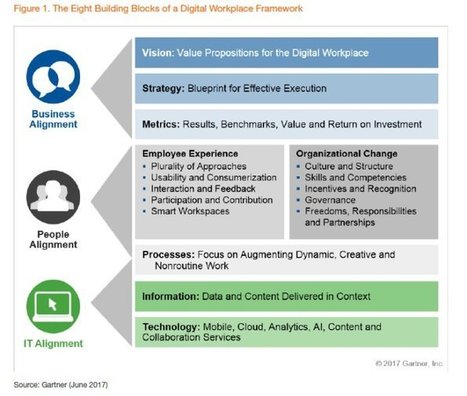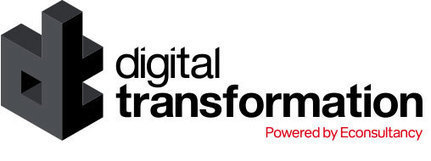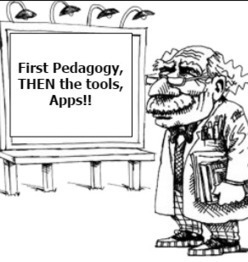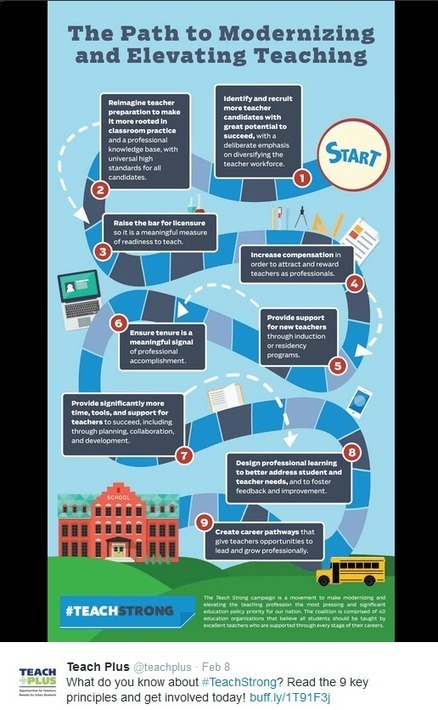 Your new post is loading...
 Your new post is loading...
The NMC has released the 2017 Digital Literacy Impact Study: An NMC Horizon Project Strategic Brief to uncover the learner’s perspective of how digital literacy training influences work life after graduation. As a complement to the definitions and frameworks outlined in the NMC’s 2017 strategic brief on digital literacy in higher education, this new study examines digital literacy in action as learners enter the workforce. More than 700 recent graduates from 36 institutions responded to an NMC survey that addressed the experiences they gained at colleges and universities, and how their proficiencies or lack thereof have affected their careers. Funding for this independent research endeavor and publication was provided by Adobe. Below are some key findings from the publication.
Via Elizabeth E Charles
The author "Gust MEES" has given courses about ICT in EDUcation and to the public willing to learn about the use of computers and the internet (youth, adults and seniors) up from 2002! The courses were given on a "Face To Face", individual "coaching" where "Teambuilding" occured and was welcome as well... There was NO time limit for the learners, those WHO needed MORE time as others to understand the given course(s) were coached till THEY understood it, while (at the same time) the OTHERS helped on place AND through the internet with THEIR collaboration till the whole class was ready. Meanwhile while THOSE WHO understood it got NEW stuff to learn as well... SO... Learners were students and teachers at the same time and THEY enjoyed learning, teaching and discovering NEW stuff... Learn more / En savoir plus / Mehr erfahren: https://www.scoop.it/t/21st-century-learning-and-teaching/?&tag=Gust-MEES https://www.scoop.it/t/21st-century-learning-and-teaching/?&tag=eBook
Via Gust MEES
A lot of businesses frequently use the term Digital Transformation, but what does it actually mean?
We have become so accustomed to digital technology, we are no longer able to imagine life without it. And yet, when it comes to the digital transformation of the work environment, we still have a long way to go. The greatest obstacle for digital transformation is simply, people.
Make digital transformation a capability, not a project; transform operations not just customer experience #hbrwebinar @gwesterman
— Parag Gogate (@paraggogate) 18 août 2017
There are a number of things that don’t have to do with technical innovations that are going to make the process more complicated. That’s not to say that creating the proper infrastructure to accommodate the rapid pace of development is not going to be a major issue in and of itself. But a number of key factors in implementing digital solutions are related to people. And while is relatively easy to change and adapt to new technology, people are not.
Many global companies start to realize their business will be mostly digital within the coming years, but not many are really interested in dealing with the digital transformation. Learn more / En savoir plus / Mehr erfahren: http://www.scoop.it/t/21st-century-learning-and-teaching/?&tag=Digital+transformation
Via Gust MEES
What has become very clear over the last 11 years is that many individuals are now using a wide selection of web-based resources, tools, and services to learn in new ways, and in doing so they have become highly independent continuous learners.
I call these individuals, Modern Professional Learners.
These Modern Professional Learners don’t just have a modern toolset for learning – i.e. they don’t just rely on educational or training tools, but they make use of a wide variety of everyday tools – they also have a new mindset about how and when learning happens for, at and through work, as well as a new learning skillset.
Modern Professionals learn for many different reasons – not just because they have to, to become competent and compliant in their organisation – but because they want to, for their own personal and professional reasons. Here are some of those reasons:
To acquire a new body of knowledge or a new skill To solve a performance problem To improve the work they currently do To keep up to date with what’s happening in their industry or professional To prepare for the future For inspiration To innovate (i.e. do or think differently) For the joy of learning Learn more / En savoir plus / Mehr erfahren: http://www.scoop.it/t/21st-century-learning-and-teaching/?&tag=Modern+Learning http://www.scoop.it/t/21st-century-learning-and-teaching/?&tag=Jane-Hart
Via Gust MEES
With a growing movement in transnational education, universities have a new challenge in achieving equality - how can they ensure all students have access to the same publications?
Via Elizabeth E Charles
The world of education is alive with buzzwords like innovation, inclusion, and mindfulness; another term gaining traction is restorative practices, also called restorative justice. Restorative practices are a burgeoning alternative to traditional punitive justice such as suspensions (both in school and out of school) and other exclusionary forms of discipline.
Many states are legislating a movement away from prescribed punitive justice for misbehavior in schools, and restorative practices are gaining in esteem as an evidence-based intervention that has proven successful when implemented correctly. Major school districts in San Francisco, Denver, and Houston are implementing restorative practices to combat inequalities in suspension and disciplinary referrals. These districts are finding that restorative practices, once understood, can be implemented with just a few simple steps. Learn more / En savoir plus / Mehr erfahren: http://www.scoop.it/t/21st-century-learning-and-teaching/?&tag=Psychology https://gustmees.wordpress.com/2017/06/02/still-following-we-have-always-done-it-this-way-or-already-on-growth-mindset/
Via Gust MEES
As more companies and more industries buy into the benefits of social media and community development, the number of job opportunities available for professionals with community-building skills also continue to grow.
Companies are looking for professionals who can blend their skills to effectively deliver updates to a community, but also have the ability to tap into that community to collect feedback for a company to use for improving its product or delivering its message.
While the job opportunities grow, so to do the number of professionals who include community skills on their resumes and profiles. On LinkedIn alone, the number of people who have added "Community Management" to their skills list is up 46% year-over-year.
But being a quality community manager goes beyond having the knowledge and background to use social media networks. Here are 10 qualities a community manager should possess to improve the chances of success in the position, according to professionals who work within social media and community today. Learn more / En savoir plus / Mehr erfahren: http://www.scoop.it/t/21st-century-learning-and-teaching/?&tag=Digital+Skills
Via Gust MEES
Ist ein Text episch, dann erzählt und berichtet er dem Leser ausführlich über eine Handlung, die zumeist in der Vergangenheit liegt. Er zeichnet sich dabei nicht durch rhythmische oder metrische Merkmale aus, wobei er außerdem nicht an Reime oder Verse gebunden ist und somit als ungebundene Rede erscheint (vgl. Prosa). Darüber hinaus gibt es in epischen Texten einen Erzähler (vgl. Erzählperspektiven). Learn more / En savoir plus / Mehr erfahren: http://www.scoop.it/t/21st-century-learning-and-teaching/?&tag=Storytelling
Via Gust MEES
The challenge is not information storage but information processing. It's not about information itself but how to use information. The teaching of creativity, curiosity, critical thinking, analytical thinking, problem-solving, and a love of learning itself will be critical to transitioning from the industrial age to the automated age. Learning how to collaborate and empathize with others will be key. To be human is not to be a lone robot performing a singular task in a vacuum but to be a member of the whole of humanity contributing in countless interdependent ways, including even entirely unpaid ways. This will require nothing less than a redefinition of work itself.
Most people when they talk about the future of work are talking about the future of paid work. But the future of work must recognize all work. Take, for example, someone editing Wikipedia, or contributing code to the open-source code-sharing platform GitHub, or even simply taking care of a family member in the same way any paid care worker would. All of that is important work but would be done for purpose, not pay.
Most people when they talk about the future of work are talking about the future of paid work. But the future of work must recognize all work. Take, for example, someone editing Wikipedia, or contributing code to the open-source code-sharing platform GitHub, or even simply taking care of a family member in the same way any paid care worker would. All of that is important work but would be done for purpose, not pay. Learn more / En savoir plus / Mehr erfahren: http://www.scoop.it/t/21st-century-learning-and-teaching
Via Gust MEES
Après le succès rencontré durant l’année académique 2015-2016, une nouvelle promotion du certificat universitaire "Smart ICT for business innovation" démarrera dès février 2018 à l’Université du Luxembourg. Organisée en collaboration par l’Uni et l’ILNAS, la formation professionnelle continue offre aux professionnels du secteur des Technologies de l’information et de la communication (TIC) une qualification reconnue en matière de technologies Smart ICT.
Le programme "Smart ICT for business innovation", mis à jour sur base des dernières avancées réalisées dans les Smart ICT (ex.: Cloud Computing, Internet of Things, Big Data, Digital Trust), permettra aux étudiants de perfectionner leur expertise dans ces domaines. En effet, la formation offre un accès privilégié aux connaissances offertes par la normalisation technique et s’appuie sur ses dernières avancées afin de fournir une connaissance de pointe dans ce domaine tout en explorant les possibilités offertes par les technologies Smart ICT pour innover et développer de nouvelles activités économiques. Au-delà des aspects techniques, le certificat universitaire intègre également un module dédié à l’innovation et au développement économique afin de faciliter la mise en place de projets innovants par les étudiants. Learn more / En savoir plus / Mehr erfahren: http://www.scoop.it/t/luxembourg-europe/?&tag=University+Luxembourg
Via Gust MEES
|
Jack Ma is optimistic about jobs in the age of AI and automation — but only if we start educating our children differently. Computers will always be better at calculating than we will, so we need to focus on service and creativity to be prepared.
“MADE IN INTERNET”
Jack Ma, founder and chairman of Alibaba, isn’t afraid of artificial intelligence (AI) or automation. Instead, he thinks we need to prepare in the right ways for the massive, disruptive changes these forces are precipitating.
“In the last 200 years, manufacturing [brought] jobs. But today, because of the artificial intelligence, because of the robots, manufacturing is no longer the main engine of creating jobs,” Ma said Wednesday at the Bloomberg Global Business Forum. “The service industry is going to be the main driver for job creation.”
ADAPTATION WILL CREATE JOBS Ma’s not alone in this thinking; many experts feel that the way we currently teach children is ineffective, outdated,won’t prepare them for automation or STEM jobs, and renders higher learning inaccessible to too many. But when it comes to AI, Ma joins a debate that’s much more polarizing, with experts taking positions across the spectrum of opinion. Learn more / En savoir plus / Mehr erfahren: https://gustmees.wordpress.com/2015/05/26/what-are-the-skills-needed-from-students-in-the-future/
Via Gust MEES
Die internationale Konkurrenz ist so groß, dass selbst gefestigte Unternehmen bedroht sind. Doch die Digitalisierung bietet die Chance zu Wettbewerbs-entscheidenden Transformationen.
Zwar arbeiten viele Unternehmen mit Hochdruck an Strategien zur Digitalisierung, allzu oft sind die Ansätze aber zu technisch und betreffen lediglich das Ist-Geschäft. Dadurch treten die wettbewerbsentscheidende Umwandlung der Firmenkultur sowie der Aufbau entscheidender Fähigkeiten in den Hintergrund. Das ist fatal, denn gerade dort wird die Basis für einen langfristigen Erfolg gelegt.
Digitalisierung ist nicht die Aufgabe weniger Experten, sondern aller Fachbereiche und erfordert neue Formen der Zusammenarbeit und der Führungskultur.
Alle Industrien, alle Branchen
Die Digitalisierung ist in vielen Branchen schon gelebte Realität, wenn auch unterschiedlich bedrohend in der Wahrnehmung. Gerade Fertigungsunternehmen klassischer Produkte fühlen sich noch wenig bedroht, auch wenn Trends wie 3D-Druck, Mehrwerte durch Produktvernetzung (Internet of Things) oder vernetzte Fertigungskonzepte bereits spürbar sind. Oft werden diese Trends als Bereicherung gesehen und nicht als Bedrohung. Doch die Gefahr besteht: Neben den digitalen Lösungen und Geschäftsmodellen neuer, aggressiver Wettbewerber ist der Verlust der Kundenschnittstelle die akuteste.
Learn more / En savoir plus / Mehr erfahren: https://gustmees.wordpress.com/2015/05/26/what-are-the-skills-needed-from-students-in-the-future/ https://www.scoop.it/t/21st-century-learning-and-teaching/?&tag=Digitalisierung
Via Gust MEES
Critical Thinking AND Proactive Thinking a MUST in Modern-EDU! WHY!? Looks to me as WE will live THE same as in 50's-60's with "James DEAN", Living on the edge Youth & Society", overload of information!? Change? At that time period it was TV, NOW it's the internet, similarities? Well, I think so!! A… Learn more / En savoir plus / Mehr erfahren: http://www.scoop.it/t/21st-century-learning-and-teaching/?&tag=Gust-MEES
Via Gust MEES
Off the paths it is almost impossible to find anything – unless you know what you’re looking for – so it feels a bit like a treasure hunt. Because really the only way to find anything in this vast forest is to be told where to look. This is how the dark web works – and it is essentially the name given to all the hidden places on the internet.
Just like the forest, the dark web hides things well – it hides actions and it hides identities. The dark web also prevents people from knowing who you are, what you are doing and where you are doing it. It is not surprising, then, that the dark web is often used for illegal activity and that it is hard to police. Learn more / En savoir plus / Mehr erfahren: http://www.scoop.it/t/21st-century-learning-and-teaching/?&tag=Darknet http://www.scoop.it/t/securite-pc-et-internet/?&tag=darknet
Via Gust MEES
A group of middle school students in full beekeeping gear examines one of the hives their school keeps in the woods nearby. “Ooh, there’s honey!” says one excitedly. “I see nectar!” says another.
These eager fifth and sixth graders from Birmingham Covington, a public magnet school in suburban Michigan focused on science and technology, are empowered to become self-directed learners through hands-on experiences in and outside their classroom.
Birmingham Covington’s student-centered philosophy is embedded throughout the curriculum, from third- and fourth-grade classes focused on teaching individual resourcefulness to an almost wholly independent capstone class in seventh and eighth grade called Thinkering Studio. Teachers at the school often say they’re “teaching kids to teach themselves” and rarely answer questions directly; instead they ask students to consider other sources of information first. Even the classrooms, with their spacious communal tables and movable walls, emphasize fluid group and peer-to-peer dynamics over teacher-led instruction. Learn more / En savoir plus / Mehr erfahren: http://www.scoop.it/t/21st-century-learning-and-teaching/?&tag=Self-Directed+Learning
Via Gust MEES
Around 45% of English vocabulary is of French origin, most coming from the Anglo-Norman spoken by the upper classes in England for several hundred years after the Norman Conquest, before the language settled into what became Modern English.
If you work in social media, explaining your job can be a frustrating experience - especially to family members who probably assume that you just use Facebook all day.
For Community Managers, in particular, there tends to be a lot of confusion over exactly what the role entails.
To clear things up, I thought I’d delve into the world of community management and find out why it’s becoming increasingly important for brands of all kinds.
Here’s a beginner’s guide.
What does a community manager do?
The role of a community manager is to act as the bridge between a brand and the community it is aiming to create (i.e. a loyal audience or group of core consumers connected by a similar interest).
They should be the brand’s ambassador, engaging with potential customers and building relationships with existing ones. They are also focused on gauging sentiment around the brand, using social listening tools in order to monitor feedback and engagement. Learn more / En savoir plus / Mehr erfahren: http://www.scoop.it/t/21st-century-learning-and-teaching/?&tag=Digital+Skills
Via Gust MEES
There is no doubt that companies of all shapes and sizes are increasing their spend in internet-of-things (IoT) technology. In fact, IDC projects this to be a $1.4 trillion market by 2021. With the increased spend and demand by consumers for low-price and high-value IoT devices, makers of these connected technologies have put a premium on affordability. The race to the bottom on price has inadvertently created major risks for organizations and consumers, according to PwC’s “Uncovering the Potential of the Internet of Things” report.
The pressure is on, and we see many makers of connected devices that produce IoT products as inexpensively as possible skipping important steps such as the design of security and privacy protections. This is generating significant new risks that are not widely understood during a time when consumers are more concerned about price than privacy and security. Risks include physical, software, encryption and network attacks, all of which could have wide-ranging effects on our daily lives, from taking over a connected car to obtaining sensitive data from a connected home to accessing a private network via a wearable device. Also, there are societal concerns, including getting access to valuable intellectual property, sabotage to companies or governments and espionage. Consumer-focused companies need to ensure they are meeting their customers’ concerns. Simply put, the proper cybersecurity and privacy measures can aid businesses in seeing the full potential of IoT. Learn more / En savoir plus / Mehr erfahren: http://www.scoop.it/t/21st-century-learning-and-teaching/?&tag=IoT http://www.scoop.it/t/securite-pc-et-internet/?&tag=iot
Via Gust MEES

|
Rescooped by
Yashy Tohsaku
from 21st Century Learning and Teaching
September 27, 2017 11:16 PM
|
|



 Your new post is loading...
Your new post is loading...



